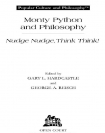Monty Python and Philosophy Gary Hardcastle (mystery books to read txt) 📖

- Author: Gary Hardcastle
Book online «Monty Python and Philosophy Gary Hardcastle (mystery books to read txt) 📖». Author Gary Hardcastle
That description may sound a bit extreme—harsh, even—but I think we have that very same gap today, right now. In the role of the easy philosophy witness the avalanche of popular culture and its unvarying sentimental assault. The hard and abstruse philosophy, what came to be called simply “analytic philosophy,” lives in the offices and classrooms of our colleges and universities. And never the twain do meet.
For me, this gap is very familiar, and not just because I’m a philosopher. Imagine a comedian on stage in a packed house, doing really well. The audience is roaring. And offstage, next on in fact, is an analytic philosopher with a few comments on, oh, the relation of indexicals to Goodman’s new riddle of induction (if you have no idea what that means, well, then, that’s the point). Maybe the philosopher has an overhead transparency or two, each displaying a full page of quotations from other philosophers in a flashy nine-point font. Here there is a gap, literally, between popular culture and philosophy. Closing it—which the philosopher must do, or try to do, when it’s time to head out on stage—is no small feat. In giving my talk, I’ve been in that same position. That is, I’ve all but been that philosopher at stage right, waiting to say something about empirical research on human rationality or the existentialist predicament, while the audience loses itself in the looniness of the “Burn the Witch!” scene or the impeccable absurdity of the Cheese Shop sketch. The fact that it all turned out okay—that I was able to go out on stage and close that gap—is good news not just for me but, I think, for philosophy itself.
In light of this gap between popular culture and philosophy, then, let’s pose the obvious questions. Chief among them, perhaps, is the question that passes through the head (if not over the tongue) of every student not sleeping through Introduction to Philosophy: why do we have philosophy at all? And given that we do have it, what should we do about the huge gap between it and, well, nearly everything else, including popular culture?
Hume’s Incomplete Advice
Hume offered one and a half answers to these two questions. For the first one, the one about why we have philosophy at all, he gave a psychological answer: he claimed that it was simply part of our psychological make-up that we aim not only to excite and move the people and things around us but to understand the true principles that govern our own excitement and movement. He writes that “man is a reasonable being; and as such, receives from science his proper food and nourishment” (p. 3). But hold on; Hume adds, right away, that human understanding is so very limited that we are inevitably unsatisfied by science alone. Actually, it’s worse than that. Man, Hume writes, “is a sociable, no less than a reasonable being: But neither can he always enjoy company agreeable and amusing, or preserve the proper relish for them. Man is also an active being; but the mind requires some relaxation, and cannot always support its bent to care and industry” (p. 3). Apparently, we can’t win. We are driven to seemingly incompatible ways of living—the active, the social, the philosophical, maybe there are more—but none by itself satisfies us.
In fact we’ve just managed to pose the second of our questions, in slightly different terms. Having cast the first question—the question of why we have philosophy at all—in terms of our psychological make-up, it’s hardly surprising when he casts the second question in psychological terms as well. The gap between philosophy and popular culture is, for Hume, the difference between the philosophical and the active disposition in all of us. Notice that this makes the gap between philosophy and popular culture a personal problem—for you, for me, and for everyone else. Having managed to make the question so, well, personal, a good answer to it might be all the more pressing, no? How are we to manage these competing tendencies? Hume’s advice is to seek them all, in a suitable balance. Cue the brogue . . .
nature has pointed out a mixed kind of life as most suitable to human race. . . . Indulge your passion for science, says she, but let your science be human, and such as may have a direct reference to action and society. Abstruse thought and profound researches I . . . will severely punish, by the pensive melancholy which they introduce, by the endless uncertainly in which they involve you, and by the cold reception which your pretended discoveries shall meet with, when communicated. Be a philosopher; but, amidst all your philosophy, be still a man. (pp. 3-4)
Eloquent prose. But rather incomplete advice, isn’t it? Seek a balance. Of course! But . . . what is the balance? And how do we find it?
Some, confronted by the gap between popular culture and philosophy, will shrug their shoulders and offer the Nirvanian mantra, “Whatever.” Maybe conflicting tendencies and a fragmented culture—philosophy in this corner, popular culture everywhere else—is just the way it is. But I think we don’t need to settle for that. We can fill in what Hume left incomplete. Remember what I said earlier about my talk on Monty Python and philosophy. It offers a way to think about philosophy and





Comments (0)